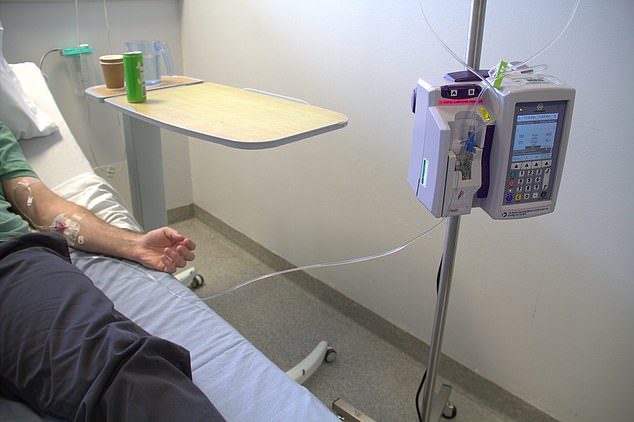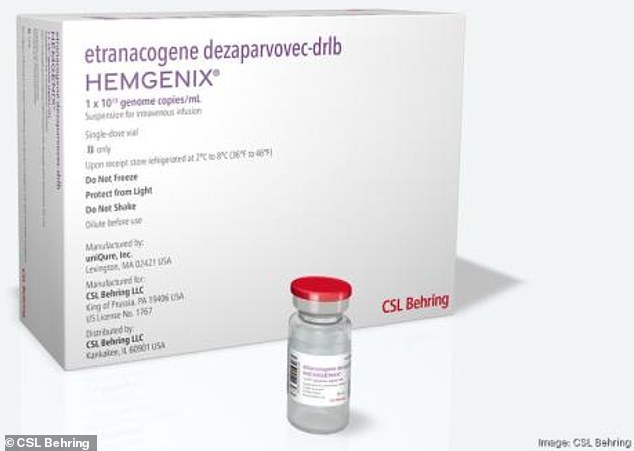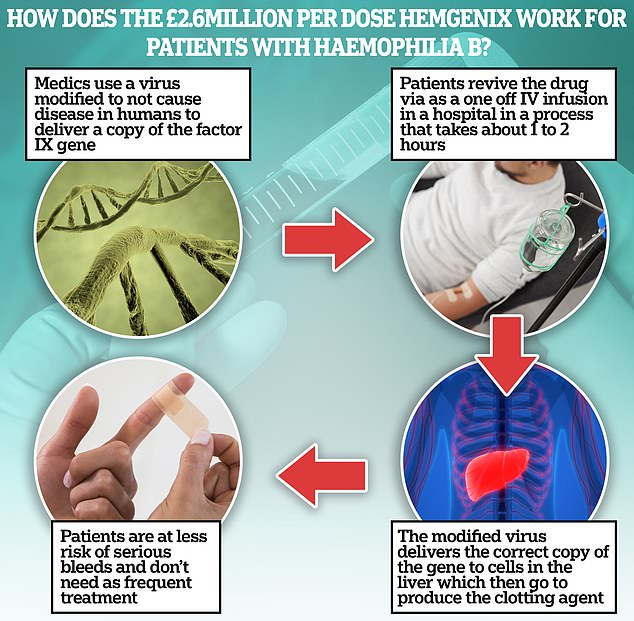A 44-year-old man has become the first ever patient to receive a life-changing dose of the ‘world’s most expensive drug’ on the NHS.
Called Hemgenix, the drug—which costs an estimated £2.6million per patient—was administered yesterday at St Thomas’ NHS Foundation Trust in London.
Delivered as a one-off IV drip, it is the only treatment of its kind for haemophilia B.
This is a bleeding disorder where the body doesn’t make enough—or any—of a vital protein critical to clotting.
Clotting stops wounds from bleeding, so those with the disorder risk suffering severe and even life-threatening blood loss from even minor injuries.
Patients also run the risk of what are called ‘spontaneous bleeds’, which can be triggered without a direct injury and even prove deadly if they occur in a vital organ.
Prior to Hemgenix, all haemophilia B patients needed regular weekly injections of an artificial clotting agent to keep their risk of catastrophic injury to a minimum.
The patient, speaking anonymously, was diagnosed with haemophilia B when he was just 18 months old, and said he was now looking forward to a life ‘free of worry’.

A 44-year-old man has become the first ever patient to receive a life-changing dose of the ‘world’s most expensive drug’ on the NHS. Credit: Supplied
‘I’ve always had to be more cautious and to plan ahead. There is a level of anxiety in that and being overly cautious has often led to missed opportunities and things I can’t do, like contact sports,’ he told MailOnline.
‘To experience a life free of the worry and to do things that I wouldn’t normally do will also be amazing.’
He added: ‘Not needing to plan ahead for treatment deliveries or looking up hospitals in foreign destinations when going on holiday, or having to tell people “sorry I can’t do that I’ve got haemophilia”, will be something I’ve always dreamed of.’
Medics and charities have hailed the roll-out of the therapy as a critical milestone for helping those with the condition lead more fulfilling lives.
Dr Pu-Lin Luo, the consultant haematologist at Guy’s and St Thomas’ who administered the treatment yesterday said it represented an ‘exciting’ step in treating the condition.
‘This is a big step forward in our ability to manage haemophilia B and could change the lives of some of our patients.
‘It is also a testament to the advancement of cell and gene therapies in the UK,’ she said.
Kate Burt, chief executive of charity The Haemophilia Society, also added: ‘Today marks an important milestone not just for this patient, but for all those living with haemophilia B in the UK.’

Called Hemgenix the drug costs £2.6million per patient, but experts insist it could save the NHS money in the long term
‘The current treatment of lifelong intravenous injections can place a significant burden on those living with haemophilia and it has an impact on broader family, relationships and work.
‘The availability of gene therapy for haemophilia B as a one-time infusion will allow those eligible for treatment to expand their horizons and live life to the full, free from the restrictions of regular injections.’
Despite being approved for use on the NHS last year, yesterday’s treatment is the first time Hemgenix has been used by the health service.
It’s also the first time the drug has been used in the UK outside of a clinical trial.
Hemgenix is the brand name of the drug etranacogene dezaparvovec.
It works by replacing a patient’s defective gene—which is incapable of producing the clotting protein—with one that can, eliminating the need for regular injections.
Studies on the gene therapy have shown the protective effect lasts for at least three years, but the hope is it could work for even longer.
There are approximately 2,000 people with haemophilia B in the UK.

Hemgenix works by replacing the patient’s defective gene, which is incapable of producing the clotting protein, with one that can, eliminating the need for frequent injections
Yet only around 260 with ‘moderately severe or severe haemophilia B’ are currently eligible for Hemgenix on the NHS.
This puts the potential total bill to the taxpayer at about £676million.
MailOnline understands, however, that the NHS acquired the drug at an undisclosed discount, so the actual cost is likely to be less.
Additionally, while the cost of the drug is roughly £2.6million per patient, medics claim the treatment actually saves the NHS money in the long term.
The lifetime cost of providing a patient the alternative weekly clotting injections has been estimated to be £8million.
This sum doesn’t include the cost of life-saving interventions and surgeries haemophilia B may also need.
Hemgenix is made by Philadelphia-based pharmaceutical company CSL Behring.
Reacting to the news today the firm’s general manager for UK and Ireland, Eduardo Cabas, said: ‘This patient receiving etranacogene dezaparvovec is a testament to the collaborative efforts of the haemophilia community, NICE and NHS England to ensure that patients in the UK are able to access this one-time treatment option.’
Hemgenix was initially described as the ‘most expensive drug in the world’ when it originally came onto the scene in 2022.
However, other drugs—also gene therapies—have since eclipsed it in terms of overall cost.
Like all medications Hemgenix does come with the risk of side effects.
Patients administered the drug take regular liver function tests to ensure the vital organ is functioning correctly.
This is because there is a risk the medication could trigger a potentially dangerous immune response.
These tests are held one a week for the first three months before they are reduced to once a year.
Patient information leaflets distributed with the drug also highlight a potential increased risk of cancer due to the fact it inserts itself into the DNA of cells.
However, clinical studies have—so far—shown no cancers have been caused by Hemgenix use.
Those taking Hemgenix must also use contraceptives like condoms for at least a year following treatment, due to a process called ‘shedding’—where the drug can be passed through bodily fluids like semen.
Patients are also forbidden from donating blood for this reason.











